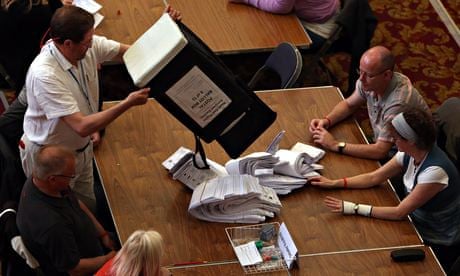Ukip's victory is the first time neither the Tories nor Labour have topped the poll in a national election in more than 110 years
Farage can claim to have won a truly historic victory, with Ukip becoming the first party apart from Labour and the Tories to top a national poll since December 1910. This was when Herbert Asquith won the highest number of seats, though not the largest number of votes.
Labour only beat the Conservatives very narrowly by doing well in London
Labour was tied with the Conservatives for most of the night and only sneaked ahead to around 25% of the national vote, compared with about 24% for the Conservatives, after London declared in the early hours. Both parties have 18 MEPs. Labour did, however, increase its share of the vote by almost 10% and top the poll in Wales, allowing it to make five gains.
Lib Dems only just avoided total wipeout
The party only held on to its last seat, in the south-east, by 6,983 votes. Its share of the vote dropped below 7%. A number of its longstanding politicians lost their seats, including former Tory Edward McMillan-Scott and Bill Newton Dunn, who had been MEPs for more than 30 years.
The Conservatives set a new low by coming third
The party lost at least 4 percentage points in its share of the vote and did not come first in any region, unlike Labour, which dominated in Wales and the north. In an attempt to put a positive spin on the loss of seven MEPs, Tory aides pointed out that the party had topped the poll in marginal areas such as Swindon, Stroud, Peterborough, South Pembrokeshire, Basildon, and North Warwickshire.
Nick Griffin said he lost his seat because people had voted for Ukip's racist policies instead
The British National party's chairman conceded early on that he had lost his position as an MEP, wondering on Twitter how he could change his handle to reflect that. Asked whether the people had rejected his party's racist policies, he told the Guardian: "They've voted for Ukip's racist policies instead."
The Greens beat the Lib Dems but their share of the vote was down
The Greens got another MEP, Molly Scott Cato, in the south-west and triumphed over the Lib Dems in many areas. This was despite the Greens' overall share of the vote dropping very slightly by 1 percentage point.
Farage's party won in Newark – and Doncaster
In a bad sign for the Tories, Ukip topped the poll in the very safe Conservative seat of Newark, where there is an upcoming byelection for the parliamentary seat of disgraced MP Patrick Mercer. The Conservatives will be throwing all their resources into the campaign before the contest on 5 June. Ukip also came first in Doncaster, a safe Labour area where Ed Miliband has his parliamentary seat in the north of the town.
Ukip would have done even better if it were not for copycat anti-EU parties
A number of Eurosceptic splinter parties – An Independence from Europe and No to EU – appear to have damaged Farage's vote. In the south-west, Ukip could have got another MEP and nudged out the successful Green candidate if they had picked up the additional 23,000-odd votes from these groupings.
Far-right and left parties have seen success across Europe
Front National won in France, the Danish People's party topped the polls in Denmark, Jobbik did well in Hungary and radical-left Syriza party succeeded in Greece. The Eurosceptics are a motley group of political parties with many conflicting views, so it is unlikely they will form a common alliance. However, the anti-EU influence on the European parliament can only increase with the election of these protest parties.
Only a third of people in the UK voted
Although Ukip came first, the turnout was just 33.8%. Millions of people voted for Farage's party, but in percentage terms, it was only about 9% of the voting population. The turnout was even lower than the last European elections, so experts warn against trying to translate these results into a prediction for next year's general election.

Comments (…)
Sign in or create your Guardian account to join the discussion